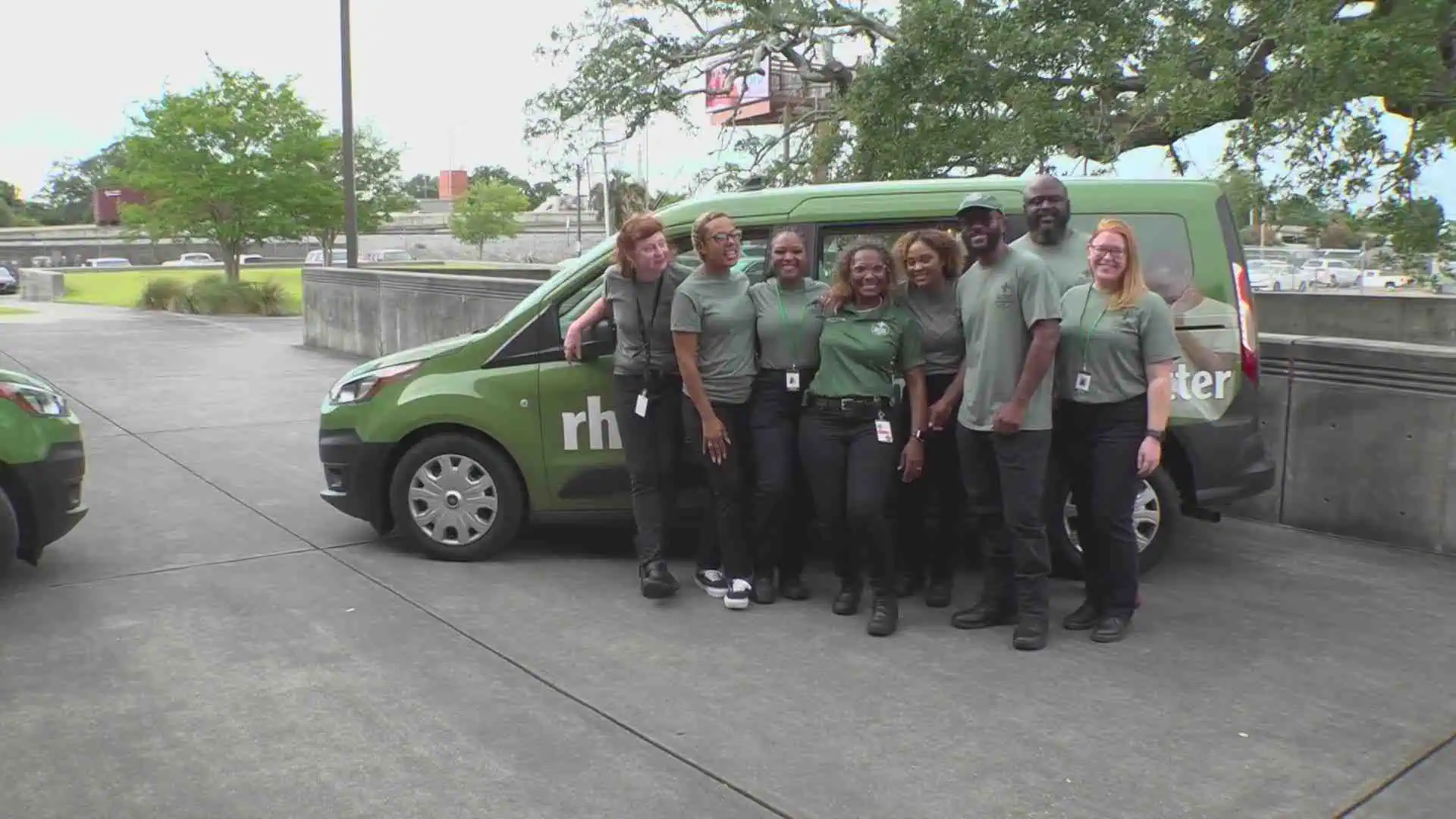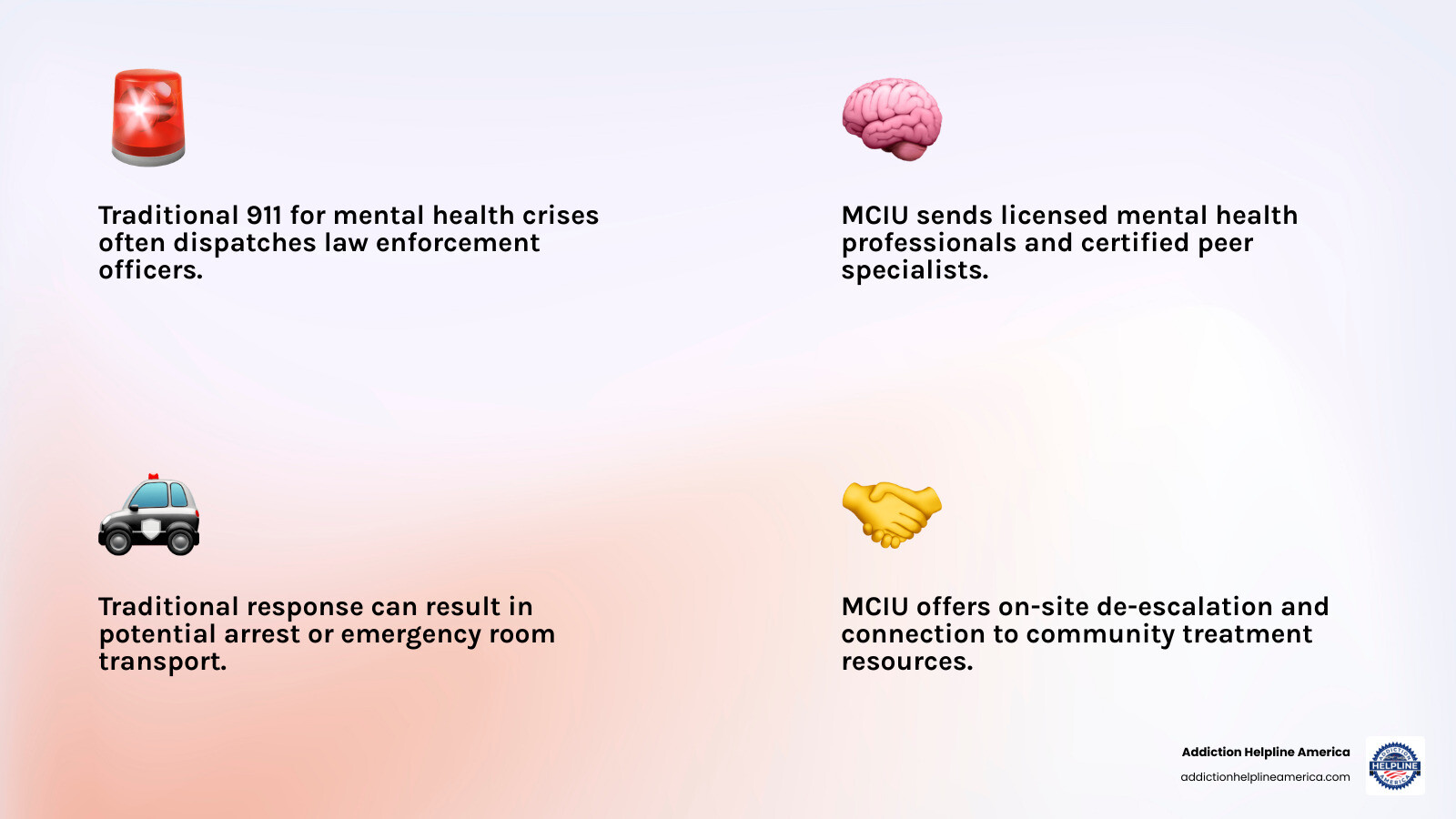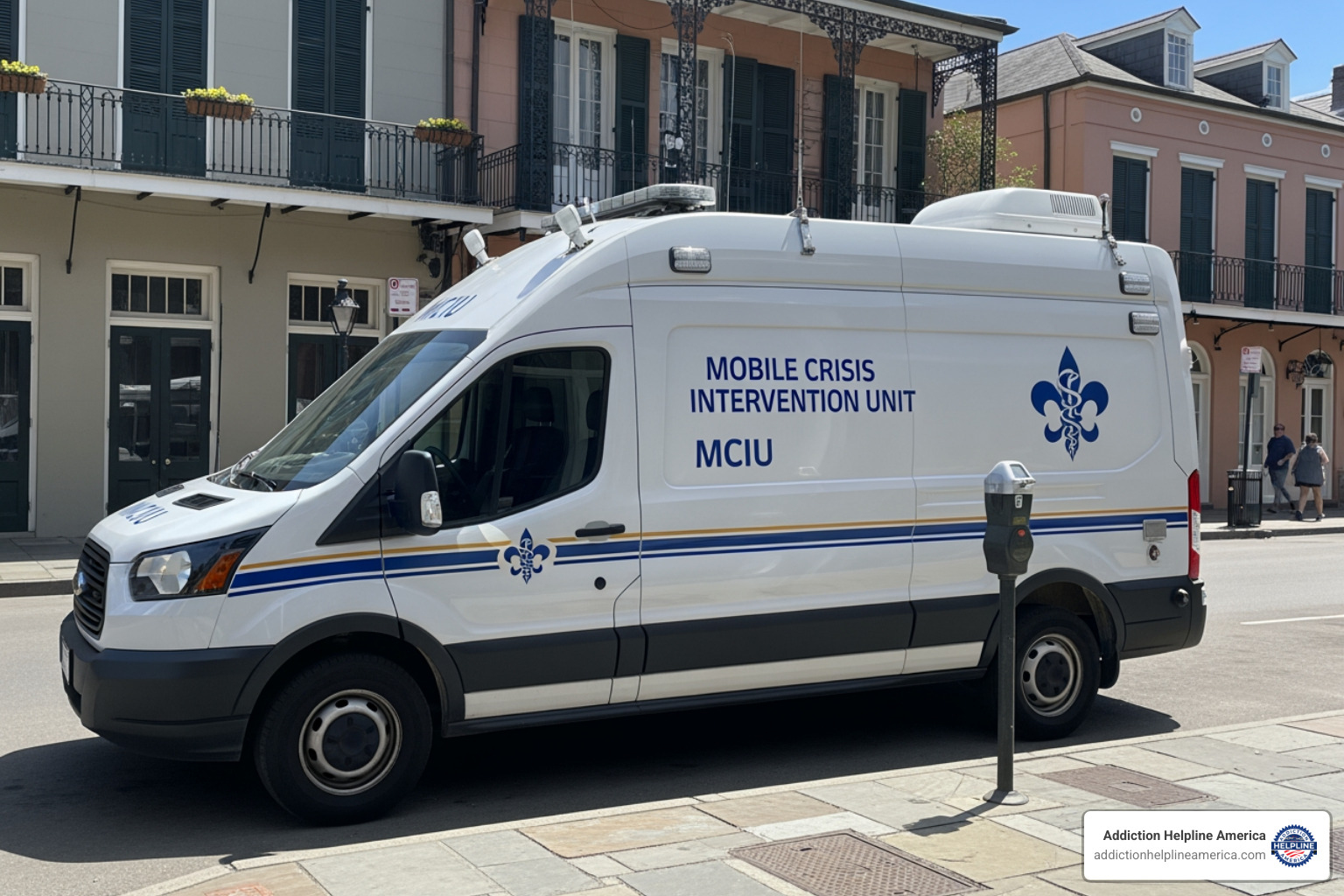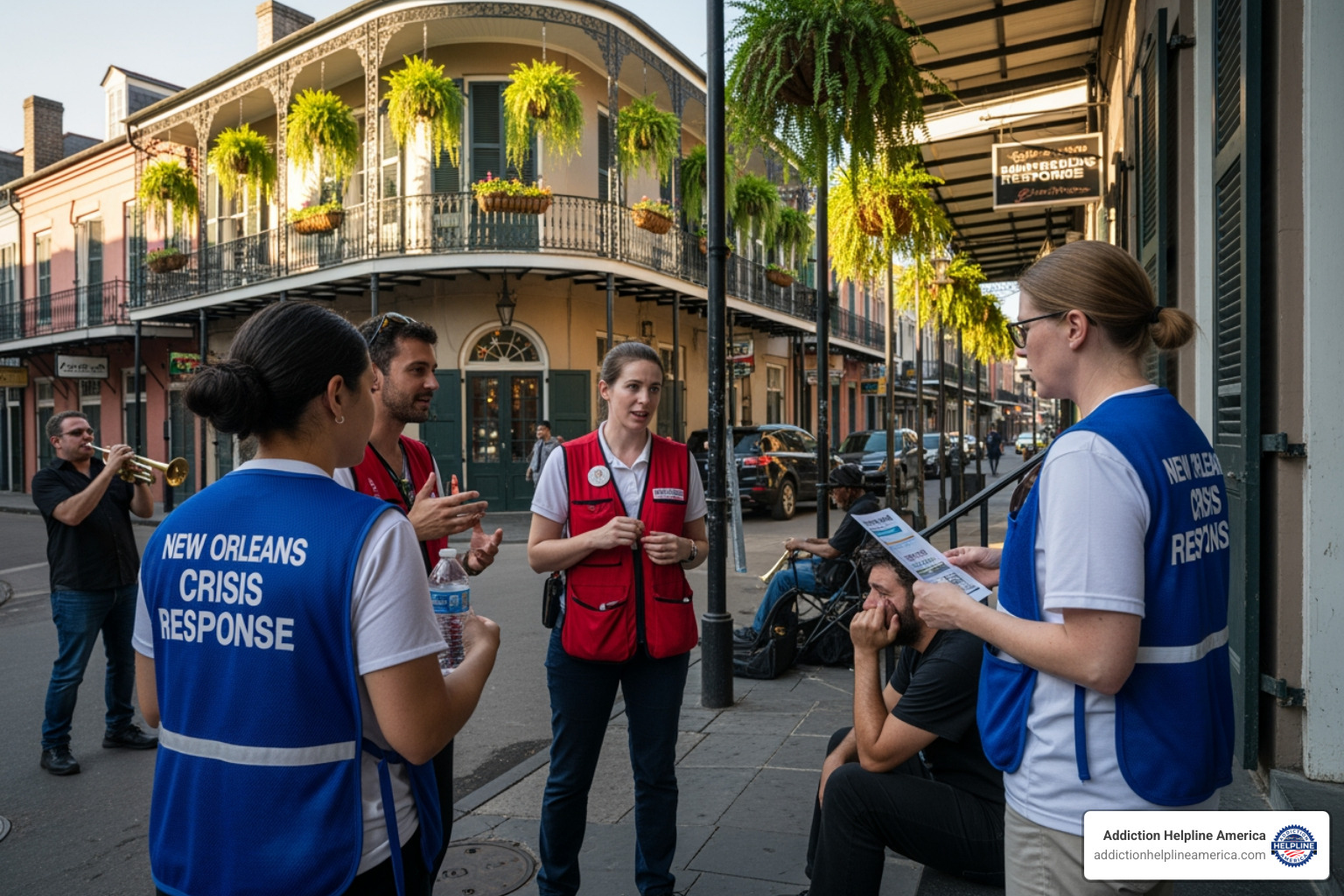
Why Crisis Intervention New Orleans Matters for Immediate Mental Health Support
Crisis intervention New Orleans offers immediate, specialized mental health support through the Mobile Crisis Intervention Unit (MCIU). This 24/7 service is integrated into the city’s 911 system to provide a dedicated response to behavioral health emergencies.
If you or someone you know needs immediate help in New Orleans:
- Call 911 for any emergency. The dispatcher will send the appropriate team.
- Call the Metro Crisis Response Team at (504) 826-2675.
- Call or text 988, the National Suicide & Crisis Lifeline.
The city has revolutionized its emergency response by ensuring that calls for mental health crises can be met by trained professionals instead of only police officers. The MCIU is designed to handle non-violent behavioral health emergencies, including psychosis, suicidal thoughts, urgent substance use, and trauma responses.
Operating as the “fourth branch” of emergency services alongside police, fire, and EMS, the MCIU has already shown a significant impact. From June to October 2023, it handled 951 calls, or about 30% of all mental health-related 911 calls. This specialized approach leads to better outcomes, reduces the strain on emergency rooms, and frees up law enforcement.
At Addiction Helpline America, we connect people with vital crisis intervention resources and treatment options in New Orleans and across Louisiana. Our team helps you steer the first steps toward recovery, understanding that quick access to Crisis intervention New Orleans services can be the turning point toward healing.
Crisis intervention New Orleans terms you need:
Understanding the New Orleans Mobile Crisis Intervention Unit (MCIU)
The New Orleans Mobile Crisis Intervention Unit (MCIU) represents a new approach to crisis intervention New Orleans. Instead of treating behavioral health emergencies as law enforcement issues, the city created a specialized team for these moments. Run by the New Orleans Health Department and Resources for Human Development (RHD), the MCIU acts as the “fourth branch” of emergency response, fully integrated into the 911 system alongside police, fire, and EMS. This ensures that people in crisis receive a response from professionals trained for their specific situation.
What is the MCIU and How Does It Work?
The MCIU operates 24/7, providing mobile, on-site support anywhere in the city. The team’s goal is to de-escalate the immediate crisis on the scene rather than resorting to hospital transport or arrest. After stabilizing the situation, they connect individuals to ongoing care and resources, such as mental health clinics or substance use treatment programs. This approach has significantly reduced unnecessary emergency room visits and lessened the involvement of law enforcement in mental health situations, allowing police to focus on public safety. Learn more about the program at New Orleans Mobile Crisis Intervention Unit – Resources for Human Development (rhd.org).
A New Approach to 911: Integrating Mental Health Response
When you dial 911 in New Orleans, trained call takers at the Orleans Parish Communication Department (OPCD) can identify behavioral health crises. For non-violent situations, they can divert the call directly to the MCIU. Sometimes, clinicians can resolve the issue over the phone. The MCIU works in coordination with the New Orleans Police Department (NOPD) and EMS. If a weapon or medical emergency is present, police or EMS are dispatched, ensuring safety remains the top priority. This integrated system provides a more effective and humane response. You can view real-time data on the program’s public dashboard: View MCIU Dashboard.
Who Responds to the Call? The MCIU Team Composition
MCIU teams are multidisciplinary and trained to provide compassionate, trauma-informed care. Each team includes:
- Licensed mental health professionals: Clinical social workers or counselors who can assess the situation and provide expert support.
- Certified peer specialists: Individuals with lived experience in mental health recovery who offer empathy, hope, and a unique understanding of the challenges.
- Crisis workers: Specialists trained in crisis intervention techniques and connecting people to community resources.
All team members receive trauma-informed training, following guidelines from the Substance Abuse and Mental Health Services Administration (SAMHSA) (Trauma-Informed Practices). This ensures they treat every individual with dignity and respect, which can be the turning point toward recovery.
The Impact of Crisis Intervention New Orleans on the Community
The MCIU is changing how New Orleans cares for its residents by approaching mental health crises as public health issues, not law enforcement matters. This shift has led to measurable improvements in community well-being and public safety. The program’s data-driven approach focuses on providing rapid, compassionate responses and connecting people to sustainable, long-term care, breaking the cycle of repeat emergencies.
Positive Outcomes and Key Statistics of the MCIU Program
The data highlights the success of Crisis intervention New Orleans through the MCIU.
- From June to October 2023, the unit handled 951 calls, representing about 30% of all mental health-related 911 calls.
- Analysis showed that approximately 2,920 calls per year could be diverted to mental health specialists.
- The city also reported a 30% reduction in crime compared to the same period in 2022, an outcome to which the MCIU’s de-escalation work contributes.
By providing appropriate care, the MCIU helps create safer communities. For more details, see the program’s launch announcement: RESOURCES FOR HUMAN DEVELOPMENT AND THE CITY OF NEW ORLEANS UNVEIL LIFESAVING MOBILE CRISIS INTERVENTION UNIT TODAY!.
What Types of Crises Are Handled by the MCIU?
The MCIU specializes in non-violent behavioral health emergencies where a person needs immediate mental health support. This includes responding to individuals experiencing:
- Psychosis
- Suicidal thoughts (without an active attempt)
- Urgent substance use situations
- Acute distress from trauma
The unit’s boundaries are clear to ensure safety. The MCIU does not respond to crises involving weapons, active violence, ongoing suicide attempts, or medical emergencies like overdoses. In these cases, 911 dispatches police or EMS first, and the MCIU may assist once the scene is secure.
Community Oversight and the Future of Crisis Care
The MCIU Community Advisory Board (CAB) ensures the program remains accountable and responsive to community needs. The CAB consists of community members and advocates who review program updates, provide feedback, and help shape the future of Crisis intervention New Orleans. This oversight guarantees transparency and helps strengthen the local safety net. The city is committed to refining crisis care based on performance data and community input. To get involved, you can Register for the CAB.
Navigating the Broader Louisiana Crisis Response System (LA-CRS)
The MCIU is part of a larger statewide network called the Louisiana Crisis Response System (LA-CRS). Developed by the Louisiana Department of Health’s Office of Behavioral Health (OBH), the LA-CRS provides a coordinated safety net across the state. A key feature is that its services are covered by Medicaid, making crisis care accessible to thousands of residents. The system prioritizes community-based support to avoid unnecessary and traumatic emergency room visits.
How the MCIU Fits into the Statewide LA-CRS
The New Orleans MCIU serves as the local Mobile Crisis Response (MCR) team. It’s the first line of support, but the LA-CRS offers additional levels of care when needed:
- Behavioral Health Crisis Centers (BHCC): 24/7 walk-in facilities that offer a calm, safe alternative to a hospital ER for more intensive support.
- Community Brief Crisis Support (CBCS): Provides ongoing support for up to 15 days after a crisis to help individuals transition and connect with long-term care.
- Crisis Stabilization (CS): Short-term, bed-based services for those who need structured support but not full psychiatric hospitalization.
This four-part system ensures a comprehensive continuum of care. You can find more information from the Crisis System of Care | Louisiana Department of Health.
Key Resources for Crisis Intervention New Orleans
Knowing who to call is critical. Here are the most important numbers for Crisis intervention New Orleans:
- 988 Suicide & Crisis Lifeline: Call or text 988 for 24/7 support. Chat is available at 988lifeline.org.
- Metro Crisis Response Team: Call (504) 826-2675 for local mental health, addiction, or developmental disability crises. Learn more at Are you in a crisis?.
- ViaLink Crisis Line: Call 211, 504-269-COPE (2673), or 1-800-749-COPE (2673) for 24-hour crisis counseling.
- New Orleans Family Justice Center: Call (504) 866-9554 for crises involving family violence, sexual assault, or stalking.
- NAMI Southeast Louisiana: Call 985-626-6538 for support, education, and advocacy related to mental illness.
These resources are available to provide immediate help. You don’t have to face a crisis alone.
Frequently Asked Questions about New Orleans Crisis Services
Navigating a crisis brings up many questions. Here are clear, straightforward answers about Crisis intervention New Orleans services.
What should I do if I see someone experiencing a mental health crisis?
You don’t have to be an expert to help. Your role is to connect the person with professionals.
- Dial 9-1-1.
- Provide your exact location.
- Calmly describe the situation. Use simple, factual language.
- State that you believe it is a mental health crisis. This is a key phrase that helps the dispatcher send the right team.
The dispatcher is trained to triage the call and will determine whether to send the MCIU, police, or EMS based on the information you provide.
Is the MCIU a police service?
No. The MCIU is a civilian-only mobile crisis team and is not a police service. It is operated by the nonprofit Resources for Human Development (RHD) in partnership with the New Orleans Health Department. The teams consist of mental health professionals, peer specialists, and crisis workers who arrive in marked MCIU vehicles, not police cars. They are unarmed and focused on de-escalation and connection to care, not enforcement. This approach is designed to provide a more compassionate and appropriate response to non-violent behavioral health emergencies.
Are there costs for using the MCIU or other crisis services?
Immediate crisis services are designed to be accessible regardless of your ability to pay.
- The New Orleans MCIU is a public service funded by the city, so there are no direct costs for its response.
- Broader Louisiana Crisis Response System (LA-CRS) services are covered by Medicaid.
- Crisis hotlines like 988 and local lines are free and confidential.
While follow-up treatment may have costs depending on insurance, the immediate intervention is typically free. Addiction Helpline America can help you understand coverage options for long-term care. Explore Louisiana rehab resources for more information. Don’t let cost prevent you from calling for help in a crisis.
Finding Long-Term Support After a Crisis
A crisis response from the MCIU or a hotline is a life-saving first step, but recovery is a journey that continues long after the immediate danger has passed. The period following a crisis is a critical window for seeking lasting help. While Crisis intervention New Orleans services stabilize the moment, continued support is essential for true healing.
Lasting change requires follow-up care, which can include outpatient therapy, residential treatment, medication management, or dual diagnosis programs for co-occurring disorders. Finding the right fit is key, as every person’s needs are unique.
This is where Addiction Helpline America can help. Our team offers free, confidential guidance to help you steer your options and connect with a treatment program that fits your needs and insurance. We can help you explore local options like the NOLA Detox and Recovery Center New Orleans LA or browse our directory to find alcohol and drug addiction treatment in New Orleans, Louisiana.
Taking the step to find long-term support takes courage, but it transforms a crisis into a turning point. We are here to help you find the right path toward lasting recovery. Everyone deserves the opportunity to heal.
Our helpline is 100%
free & confidential
If you or someone you care about is struggling with drug or alcohol addiction, we can help you explore your recovery options. Don’t face this challenge alone—seek support from us.
Programs
Resources
Will my insurance
cover addiction
treatment?
We're ready to help
Find the best
drug or alcohol treatment
center
Are you or a loved one struggling with addiction? Call today to speak to a treatment expert.
















